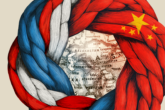August 07, 2018
China Dreams of America Alone
As the prospect of a U.S.-China economic confrontation grows more likely by the day, Beijing takes comfort in the ongoing tensions between the United States and its allies that flared anew during President Donald Trump’s recent trip to Europe. American efforts to push back against China’s mercantilist practices will falter without the support of key allies—above all Europe —where frustration with the Trump administration today outweighs serious concerns about Beijing’s economic behavior. If current frictions endure, Beijing is likely to believe—not wrongly—that it can isolate the United States from its allies, rebalance trading relationships, and ride out temporary economic disruption.
Chinese thinkers have long recognized that U.S. alliances are America’s most important comparative advantage in the geopolitical competition for twenty-first-century preeminence. With allies, the United States achieves more. Without them, its position as the world’s leading power is increasingly precarious.
Even if President Trump is not attuned to this, China’s President Xi Jinping certainly is. Indeed, over time, Xi’s speeches have implicitly criticized America’s “ outdated geopolitical maneuvering ” and “ cold war mentality .” In a 2014 speech outlining his regional vision, Xi articulated a future in which, “Asian people, through strengthening cooperation, have the abilities and knowledge to achieve peace and stability in Asia.” Notably absent from Xi’s vision is American leadership in the Indo-Pacific region.
In fact, China has taken concrete steps to undermine the strength and resiliency of U.S. allies.
In South Korea, China perpetrated a long-term campaign to exact economic revenge on Seoul in response to its decision to deploy the Terminal High Altitude Air Defense (THAAD) system, which China maintains jeopardizes its deterrence capabilities. Beijing did not believe American and South Korean assurances that THAAD focuses solely on the ballistic missile threat from North Korea. South Korean conglomerate Lotte, which sold the land housing THAAD to the South Korean government, was forced to cease operations in China due to “fire code violations.” In the tourism sector alone, South Korea lost an estimated $5.1 billion in missed revenue from Chinese tourists who Beijing prevented from traveling to South Korea. Overall, South Korean exports to China declined by $13 billion from 2015 to 2016. Facing domestic and economic pressures, South Korean Foreign Minister Kang Kyung-wha made a public statement in October 2017 that Seoul would not consider any additional THAAD deployments, effectively ending the row.
Read the Full Article at The National Interest
More from CNAS
-
The Future of Russia and China in Central Asia
Despite the many proclamations that Russian and Chinese interests would collide in Central Asia, Moscow and Beijing continue to work together in service of their shared object...
By Andrea Kendall-Taylor & Jim Townsend
-
Russia and China in Central Asia
Executive Summary Despite the many proclamations that Russian and Chinese interests would collide in Central Asia, Moscow and Beijing continue to work together in service of t...
By Andrea Kendall-Taylor, Lisa Curtis, Kate Johnston & Nathaniel Schochet
-
‘Trump Will Use His Strength For Peace': Ex White House Official
Lisa Curtis, Director of Indo Pacific Security Program at the Centre For A New American Security, says that in his second term, Donald Trump has learnt to be careful with his ...
By Lisa Curtis
-
Trump vs. Harris: Who Holds The Edge On Election Eve? Discussing With Lisa Curtis
CNBC-TV18 spoke to Lisa Curtis, from the Indo-Pacific Security Program at the Center for a New American Security, to examine the key election trends as the U.S. presidential r...
By Lisa Curtis




